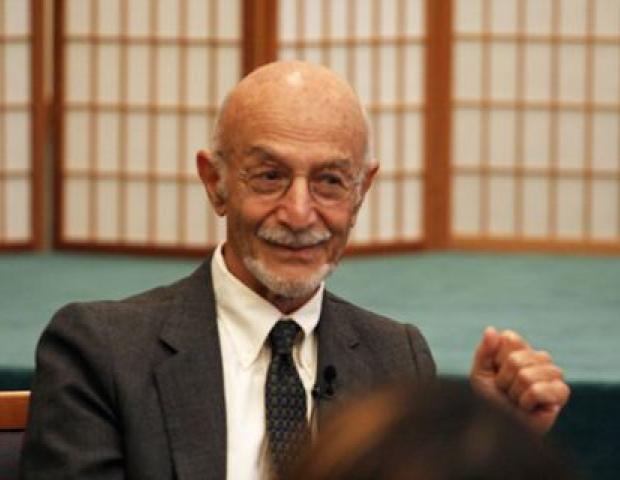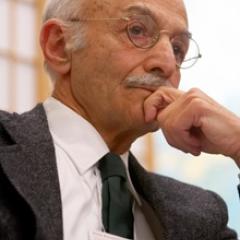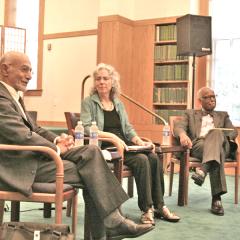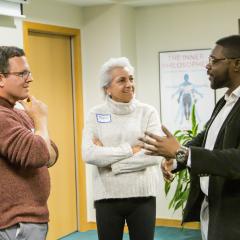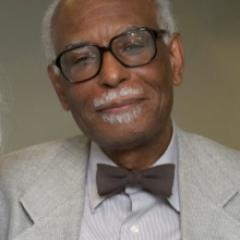Nur Yalman Interview: Empathy Is What Makes Us Human
Nur Yalman at the Center's 2011 "Soft Power" seminar
Nur Yalman is Professor of Social Anthropology and Middle Eastern Studies at Harvard University. A Fellow of the American Academy of Arts and Sciences, his major work is the classic anthropological text Under the Bo Tree: Studies in Caste, Kinship and Marriage in the Interior of Ceylon (1967). Professor Yalman has also published a dialogue book with Daisaku Ikeda, published in English as A Passage to Peace. In 2009, Professor Yalman invited several of his Harvard colleagues to join him at the Center’s meeting space to celbrate the book and explore the potential of dialogue and humanism as frameworks for achieving greater peace and justice in our world. A few weeks later, in March 2009, the Center’s Mitch Bogen interviewed him on these topics, and more.
Your dialogue with President Ikeda was characterized by a sense of warm, interpersonal connection. Why is this form of dialogue important?
It seems to me that these personal dialogues are absolutely vital. If we are going to have a more peaceful world, we need to have friends across cultures and civilizations. And what better way to make friends than to have intimate conversations about matters that you care about?
It can be argued that a mere conversation between two individuals is a minor contribution in a world fraught by large-scale conflict.
It’s certainly true, but one has to make the effort. Of course, President Ikeda is an important personage in Japan, and what he thinks and says affects lots of people. And I like to think that I might be able to influence people’s thinking, both in the United States and Turkey, through my work with students, through my writings, and so on. So every little bit is necessary.
You’re absolutely right that we are facing total misunderstanding and lack of comprehension in the way our governments and diplomats are handling our affairs around the world, and this is why there is so much talk again of war in the world. I think this is a very distressing matter. I think war is no answer at all.
I’m reminded of, and would like to underline, the ideas of Gandhi once more. He said the ends do not justify the means. It is the nature of the means used which determine the character of the ends that are achieved. I think this is a very wise statement. If you use violence, you get violence. And we’ve seen that everywhere: Violence has begotten violence.
We need understanding, and we need justice. And that, of course, is not easy to achieve. But we must try.
This topic of ends and means was an important part of your conversation with President Ikeda. What are some of the other important ideas that you hope readers will encounter in the book?
That question of ends and means is really the crucial matter. But apart from that, there is the matter of fundamentalism and closed attitudes. I think that President Ikeda, though he is coming from a Nichiren Buddhist tradition, has shown extraordinary empathy for other traditions. This he has shown in his many conversations with world leaders. He certainly demonstrated understanding of the situation in Iran in his conversation with Majid Tehranian [Global Civilization: A Buddhist-Islamic Dialogue, British Academic Press, 2003]. In our conversation, he showed an equally open attitude toward the cultural problems and religious issues in Turkey. And I think that matters.
Empathy – being able to think into the mentality of other people – is a crucial human attribute. The great sociologist and writer of the 18th century, Jean-Jacques Rousseau, said that empathy – the feeling of empathy – is what makes us human. And that idea was picked up by one of the great modern social scientists of France, Claude Levi-Strauss, who echoed Rousseau, indicating that this really is the basis of anthropology: to be able to think into the skin of other people, to think like them, and to try to understand them.
During the dialogue you emphasized some of the contributions of Islam to world culture. Why is important to look at the positive contributions that religions make?
Religions can be very dangerous utensils in the hands of man. They can be used for terrible acts – and we have seen religions being used for terrible acts, right through history. Islam, certainly, has been used very badly, as we know from recent events. But, then, look at Buddhism, and what is happening in Sri Lanka, the way Buddhism has been misused there (1), and also in other Buddhist countries. So, religions by themselves can be turned in very negative directions.
At the same time, religions are means of humanizing our animal natures. We are, of course, animal creatures, but we have to be turned into human beings by morality and ethics, and religions are among the instruments that provide the morality and ethics. It is at the level of morality and ethics and the teachings that religions can have a dialogue with one another.
The other element, the element of identity, goes in the direction of tribalism – and that makes for closed minds. It is the element of ethics and morality that makes for interesting discussions across religions. And it is, in this sense, that Islam is second to none. What I have in mind here are the profound traditions for equality and individual responsibility in Islam. For example, we see how concern for the poor, for community, is expressed in the obligation for “tithes” (zakat). And we see that empathy and concern for the other – “love” in a more abstract sense — is the constant theme of the great Muslim poets, including Rumi, Hafiz, Khayyam, Yunus Emre, and hundreds of others in a long line of brilliant writers.
Islam has also made great contributions philosophically, having long been involved with all the classical problems of the religions – that is to say, faith and belief and rationality, and how to square the problem of faith with rationality. That particular debate is really at the root of Islamic philosophy. It would become a major issue for Christianity, as well, for example, as shown in the work of Thomas Aquinas during the 13th century. It then goes on with Francis Bacon, Hobbes, and Descartes, and on to Kant and Hegel, down to our day.
During the recent seminar, as well as in your dialogue with President Ikeda, you alluded to the vital importance of education as a method or means toward a more peaceful world. Can you discuss your thoughts on education?
I’m passionately interested in this subject. After all, I am an educator and have spent my life trying to educate people. Yet, indeed, it is only through intelligent education that we are going to get a peaceful world. How to achieve levels of intelligent education is not an easy matter. A little knowledge is a very dangerous thing.
We are in the process of creating educational systems around the world that may or may not be for the good. In order that they become elements for the good, we must address this issue of tolerance, understanding, openness to others, and the cultivation of open minds. Reason and rationality, as well as morality and ethics — all must be included in educational systems. And it is a very subtle matter. For example, people often come to the university with fairly settled opinions and prejudices arising from their backgrounds. It is subjects such as philosophy and anthropology that give examples of different ways of thought and of different ways of life, which might lead the way for an opening of the mind and the spirit.
I hope we can get more people thinking about these matters. Otherwise, it’s very easy to use educational systems for creating tribal mentalities. We have seen a lot of that in the 19th and 20th centuries, in which people essentially, through education, glorified their own particular, narrow histories and identities: a very dangerous process, which sets people against one another. So, we must have an education that is appropriate for the needs of a larger humanity and a smaller planet.
If you use violence, you get violence. And we’ve seen that everywhere: Violence has begotten violence.
Nur Yalman
Many people in the United States probably believe that this sort of education for tolerance is a harder sell in the Muslim world than here in this country; that, perhaps, Muslim countries are less amenable to this idea.
That is very true. And there are good reasons why that is so. As I mentioned before, all religions can tend toward close-mindedness, especially when they focus on identity. And Islam is no exception. But it is also the case that Muslim countries are the ones that bore a heavy brunt of colonialism and imperialism in the last 200 years in those lands between Europe and the Far East. And so, they tend to react negatively to pressures coming from Western countries such as Britain and France, and, in various parts of the Muslim world, from the Dutch, or others. The fact that they are still suffering under tremendous aggressive acts from Western societies makes them, of course, very defensive, in cultural terms. It is true.
Think of how often Islamic countries have been occupied and bombed, how many persons killed and families dispersed as a result of Western military action since the 19th century.
The only way to get out of this is to try and improve the sense of self-reflection among Europeans, in particular, who have been guilty of being racist. The racism that they expressed in the 19th and 20th centuries against Jews has now turned against the Muslims, adding to the already considerable colonial legacy of prejudice toward the Muslim world. The colonial legacy of denigration builds on earlier traditions of hostility going all the way back to the Crusades. This weird idea of a “pure” Europe has gone so far as to lead a former president of France (M. Giscard d’Estaing) to claim that Islam is alien to Europe, when it is perfectly obvious that European history is deeply intertwined with Islamic history, from Arabic numerals in Spain to the role of the Turks during the Reformation. And what about those millions of European Muslims, Bosnians, Albanians and others, or the Turks in NATO and the Council of Europe?
So there is now a big problem of Islamophobia in Europe, but also in the United States. There is a great worry about “What are ‘these Muslims’ up to?” and “Are ‘they’ going to get us?” — when, in fact, the ones that really have to worry are not “us” but “them”! Because, many of these Islamic countries – Algiers, Morocco, Tunisia, Egypt, Iran, Iraq, Lebanon, almost all the Muslim countries, except for Turkey – have all been occupied, at least until recent times, by Western powers. So there is indeed a major international, political, and diplomatic problem here that leads to closed minds.
One issue that arose during the seminar was a concern for the way that the West has used the concept of humanism as another way to dehumanize “the other,” for example, Muslims. But it was agreed, too, that there could be a truly inclusive global humanism that could make a more positive contribution.
Indeed so. And we are seeing a form of this global humanism in our great universities, where students from all over the world are establishing good, friendly relations with lots of people from totally different backgrounds.
The future is fraught with danger. The fact that the world is growing smaller does not mean that it is getting more peaceful. With so many large populations moving around, we are beginning to see a situation in which different communities are feeling threatened – threatened because their cultures are coming under question, as in the case of Britain with her ex-colonials, France with North Africans, Germany and Austria with their Turks and Balkan peoples, or Russia with her “colonials,” and many others. Even Turkey and Indonesia could be added to this list. And so, this might well lead to greater violence and greater misunderstandings between different groups.
But at the same time, the other process is at work – the process whereby you are getting intelligent people who are able to get out of this tribal mentality that I spoke of earlier, who are able to get beyond the tribalism of their cultures and religions to establish an intelligent link, an intelligent human spark, with people from other backgrounds. This group, I think, is also growing. And that is what gives me hope for the future.
How do you view the questions and controversies surrounding the status of women in Islam?
This is an area where biting critiques from the modern West resonate meaningfully with the progressive circles among Muslims. There is clearly a long way to go on this controversial matter for traditionalists everywhere. I need hardly add that the subject of the rights of women raises passions in many circles here in the US, as well as in Japan and Europe. Conservative circles among Muslims react defensively in saying that Islamic law has actually improved and safeguarded the status of women and the family. This may well be true when compared to the state of affairs in the Middle Ages and/or the ancient world, but it is hardly a sufficient argument for the interests and rights of women in our present day. Deeply conservative communities have barely begun to think clearly on this subject and all that it implies.
Fortunately, there are highly intelligent and articulate Muslim women who are pioneering the breakup of hoary old taboos. There are now serious cultural and legal challenges to entrenched interests in many parts. Debates and changes are on the agenda in many important countries with Islamic communities. I am thinking of Turkey, Iran, Egypt, Morocco, Syria, Jordan, Malaysia, Indonesia and many others. The way forward will not be easy however.
You are fond of quoting Andre Gide that “the individual is the most irreplaceable being.” What does that mean to you?
It means a great deal to me, because I’ve lost very dear friends. I’ve lost very, very dear people close to me. I know that they are going to be irreplaceable. There’s no question about it. Individuals are irreplaceable. Andre Gide was absolutely on target. Maybe flowers and animals are also irreplaceable, but they are not quite as irreplaceable, I think, as human beings with their extraordinary individuality and consciousness.
What is wonderful about the great religions, all of them, is that they all recognize this. For example, in all of them, there is the mysticism associated with individual perfection and the individual attempt at understanding the nature of divinity and of human life.
Does this relate to your strong belief in the promotion of human rights?
Absolutely. This is precisely where I feel we are at now. In this new world we have created in the 20th and 21st centuries, we have become very conscious of human rights everywhere. And human rights are under threat almost everywhere, including this beautiful country here. So, the issue of human rights seems to me an absolutely critical issue if we are going to deal with the dignity and the sacredness of the individual as an irreplaceable being.
The idea that these irreplaceable beings, even when they have done terrible acts and have been apprehended – the fact that they can be tortured and denied justice makes for a great anxiety for the future. So, yes, individualism and human rights and, of course, justice are elements that go extremely well together.
You and President Ikeda both emphasize the value of international institutions such as the United Nations, a somewhat unpopular idea now.
It is amazing to think that the United Nations, which is an organization that was created especially with the help of the United States, has become such a controversial issue in this great country. It seems to me that the way to the future lies in getting out of the tribal mentality. The only way forward is through an organization like the United Nations. We will have to have governance for Spaceship Earth. (2) It’s inevitable that there’s going to be much more international organization, administration, and regulation.
We’re seeing the need for it daily, as we look at the newspapers, with this desperate attempt to put some order into our financial affairs. It is absolutely clear there will not be order in our financial affairs unless we get all the other important actors, which means all the other important countries, in line. And the only way to get them in line is by working with international institutions. So we’re going to be creating, I foretell, many more international institutions as the problems of the world become common problems, which have to be solved with common means.
And we’ll have to think about how to improve the United Nations. I’m the first one to agree with President Ikeda that the present set-up in the U.N. needs a lot of improvement. It is not an organization that is very responsive to the needs of different countries and the different continents. It won’t be easy, but there’s no other way.
What about international safeguarding of human rights?
The question of regional courts of human rights is something that I’ve spoken of previously. I mentioned it in the discussion with President Ikeda. I think we will seriously have to think about the nature of human rights and how they can be protected. I know that that is not a popular subject either, but is a subject that is, in fact, on the front pages of all newspapers almost every day. The problem of human rights in the context of the “torture” discussions is now a front line issue in Britain, Germany, and Spain, as well as in this country. The right to privacy, too, is an aspect of human rights.
There are terrible events taking place around the world. The only way forward will be to begin to enlarge the example of the European Union, which has a court of human rights – administered through the Council of Europe. In any case, there is a court of human rights to which different countries have become signatories. And, so, individuals from different countries can apply to the court in Europe and get some sense of justice. This court has ordered many countries to pay damages in quite considerable sums to individuals who have been wronged by their governments.
Now, if this can be done on a continent so fraught with anger and hostility and the heavy burden of terrible history as Europe, I think we might be able to manage it in other parts of the world. I think it is something that might well become an important issue in the future.
Notes
1. Sri Lanka has been an important center for Buddhist religion and culture since the 2nd century BCE. In recent times, majority-Buddhist Sri Lanka has been identified by international groups such as Human Rights Watch as a violator of human rights, with the government engaging in torture and forced disappearances in their conflict with the non-Buddhist, secessionist Tamil Tigers, who are also accused of human rights abuses. The government is supported by what the Christian Science Monitor (June 18, 2007) describes as “hard-line monks” and others in the Sinhalese Buddhist nationalism movement who advocate military strength and who observers say also assist and participate in human rights abuses.
2. The concept and phrase Spaceship Earth was popularized during the 1960s by figures such as Adlai Stevenson, Kenneth Boulding, and Buckminster Fuller. In a 1965 speech to the UN, Stevenson said, “We travel together, passengers on a little space ship, dependent on its vulnerable reserves of air and soil.”
